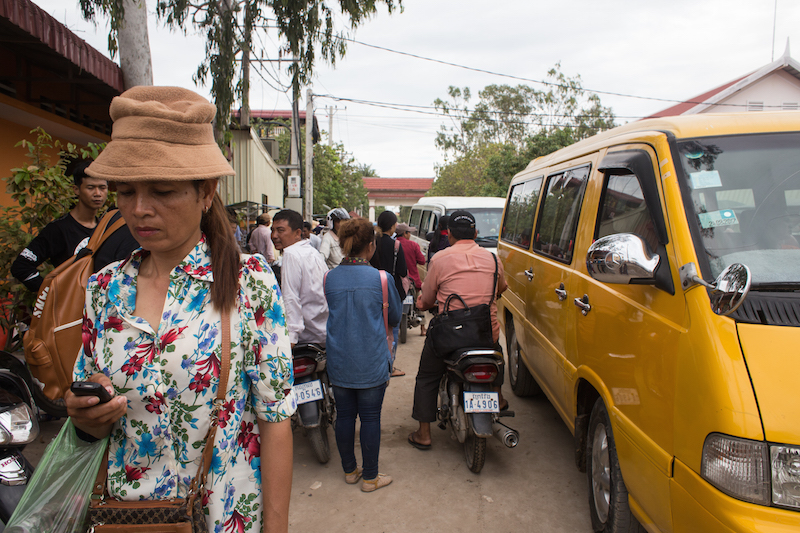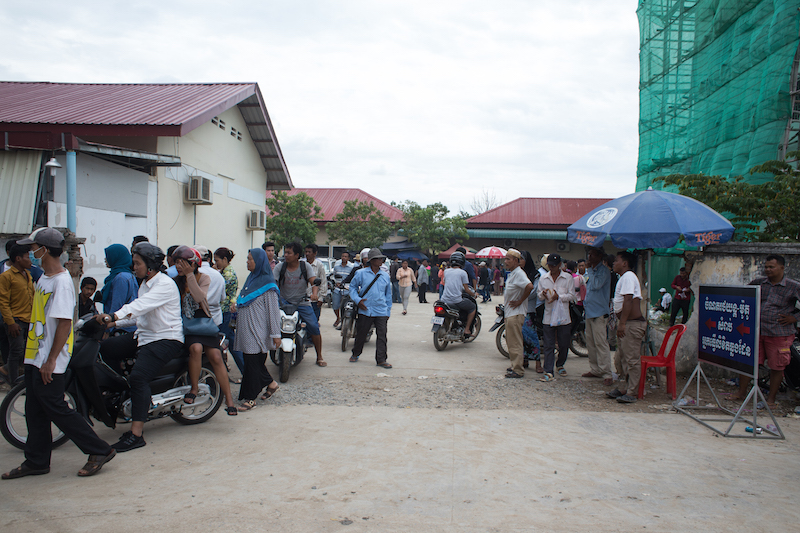On a narrow side street on the outskirts of Phnom Penh on Tuesday, cars and tuk-tuks crept slowly along as hordes of pedestrians and motorbikes blocked their paths. Food carts and steady streams of customers lined the road.
The crowds overran the compound at the Interior Ministry’s passport department, part of a surge that followed newly passed laws in Thailand that led thousands of Cambodians working there without proper documents to flee over the past two weeks.

The crowd numbered in the thousands. People sat on the ground as they waited to be called or amassed in disorganized queues outside processing rooms.
Koy Kem, a 28-year-old construction worker who had been employed in Thailand’s southeastern Chonburi province, said he arrived from Banteay Meanchey province at about 8 a.m. and had submitted his application by noon.
He fled Thailand with seven Cambodian colleagues five days ago, he said, after his employer told them authorities were rounding up illegal migrant workers.
“I was afraid police would arrest me,” he said.
Mr. Kem said his company had organized the payment for its eight workers’ passports, and he planned to return to Thailand while the documents were being processed.
Another construction worker, 20-year-old Chea Nathy, said she had worked in Thailand for four years and returned home over the weekend after her employer could no longer pay off Thai authorities “so that they won’t come to arrest us.”
Ms. Nathy said she expected her passport—for which her employer had paid—to take several months to process. She said she needed the money, so she planned to return to Thailand in the meantime.
“I will go back to Thailand through an unofficial border crossing,” she said. “I’m taking the risk.”

Before the new rules were released in Thailand—carrying harsh punishments for undocumented workers, as well as their employers—the passport department received as many as 1,000 passport applications per day, director Prum Chan Sokha said. Since then, however, the department’s workload has jumped, he said.
Marquees were erected to provide shade for those waiting outside under the sun, while staff were working overtime, Mr. Sokha said. Normally, the office opens at 8 a.m. and closes at 4 p.m. “Now, sometimes we’re open until 6:30 p.m,” he said.
Staff member Tith Vanthaden said there were more than 3,000 applicants on Tuesday at the center in Chbar Ampov district on Tuesday, the only facility in Cambodia that handles passport services.
About 300,000 of the more than 1 million Cambodians working in Thailand do not have any legal documents, including passports, according to the Thai Labor Ministry, Labor Minister Ith Sam Heng said last week.
They are drawn by higher wages across the border. According to The Bangkok Post, the daily minimum wage in Thailand is about $9. Although there is no set standard minimum wage in Cambodia, anti-poverty NGO CARE Cambodia has said the country’s construction workers earn between $5 and $7 a day.
Thailand’s new laws allow for undocumented workers to be jailed for up to five years. After panic and confusion caused a mass exodus of the country’s migrant workforce—mostly made up of Cambodians, Burmese and Laotians—the government announced that enforcement of the laws would be suspended until January 1.
On Tuesday, Troy Dooley, program manager at the International Organization of Migration, said the waves of returnees had receded and things were “back to normal” at the Poipet International Checkpoint, the biggest checkpoint along the Thai border.
On Monday, 192 Cambodians came through the checkpoint, he said, and an average day under normal circumstances would see about 200 or less.
“The numbers have been gradually declining since about the 4th of July,” he said, adding that a jump to about 600 returnees on Sunday could be attributed to a large number of deportations from Malaysia, where a similar crackdown to that in Thailand has taken place.



